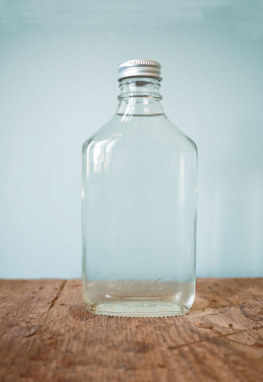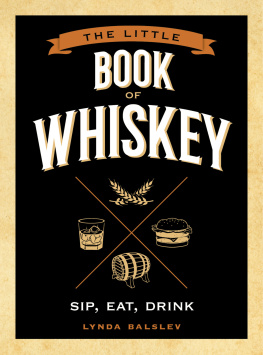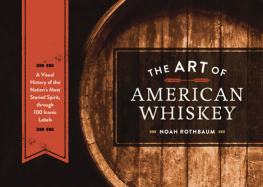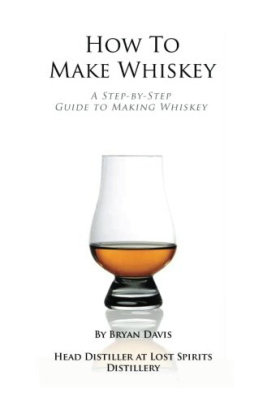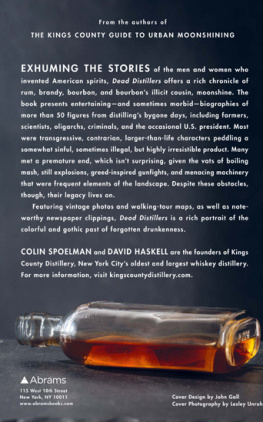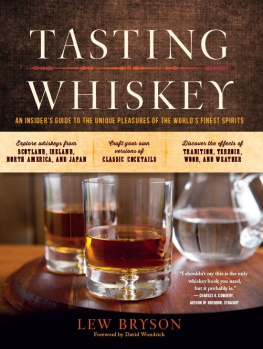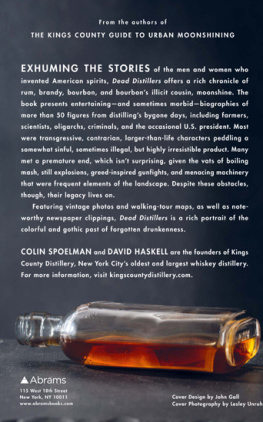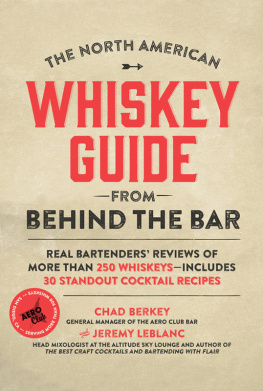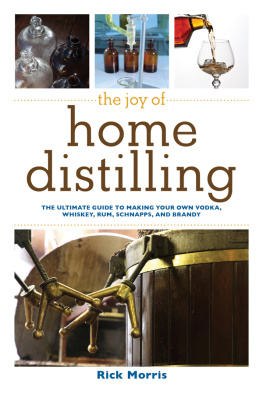

ABOUT THIS BOOK
Kings County Distillery is an idea that turned into a pastime that grew into a business, but mostly it is an extension of a college friendship. Distilling whiskey takes time and requires patience. We wouldnt have lasted very long at it if we didnt enjoy each others company.
Kings County is predicated on a discovery: You can actually make very good whiskey at home, and reasonably easily, and the possibilities of whiskey are much greater than what liquor store shelves suggest. That seemed to us like an opportunity, something worth exploring in our time off.
This book is something of an attempt to answer the many questions we stumbled over as we taught ourselves to make whiskey. It is a collaborative effort, written by Colin and edited by David, and we hope it provokes other old friends to start making some of what they drink.
CONTENTS
CHAPTER ONE:
WHAT IS WHISKEY?
CHAPTER TWO:
A HISTORY OF WHISKEY
CHAPTER THREE:
A SURVEY OF WHISKEYS
CHAPTER FOUR:
HOW TO MAKE WHISKEY
CHAPTER FIVE:
HOW TO DRINK WHISKEY
PROLOGUE
Its hard to find a drink in eastern Kentucky. When I was in high school, there were rumors of a Coke machine in the clubhouse at the ninehole country club that spit out cans of free beer. There were stories you could get alcohol at the VFW, but nobody ever seemed to go there. Harlan County was dry, which meant that selling any intoxicating beverages was forbidden by laws as old as Prohibition. For most people, bootleggers proved to be the most convenient solution. They were closer than the drive to the nearest wet town, half an hour away, or to Virginia, which, while closer on the map, was over two mountains. Also, bootleggers didnt card.
Our bootlegger lived on Pine Mountain, in a gray trailer that sat in a gravel lot by the side of the road that could have been mistaken for a widening of the shoulder. The yard, or what there was of it, offered views out over the Cumberland River valley. I wasnt old enough to drive, but my friend Derek was, and he had the connection.
You turned off the main road into the little parking area between the house and a corrugated metal shed. You shut the headlights off (business here was done after dark). A man emerged from the rear of the house with a flashlight, which he kept aimed at the ground or into his palm. He sold Zima, Mad Dog, and Seagrams 7, and maybe other things, but I was a sophomore in high school in the mid-1990s, and my worldview was limited. You told him what you were looking for; he would disappear behind the shed, sometimes for quite a while, and finally return with a brown paper bag. Yall be good, hed say and then disappear. Then we would turn the headlights back on and back out of the driveway.
We didnt drink very often, but when we did, wed head up into the hills with chasers, jerky, and dip tobacco, park the cars around a patch of dirt, and light a bonfire out on the artificial prairie of an abandoned strip mine. We called this camping. There were no bands, no cocktails, no cover charge, and it was all ages, pretty much all the time. You could see for miles across the tops of the mountains. No one lived anywhere nearby. It was about as far from any sort of culture as we could get.
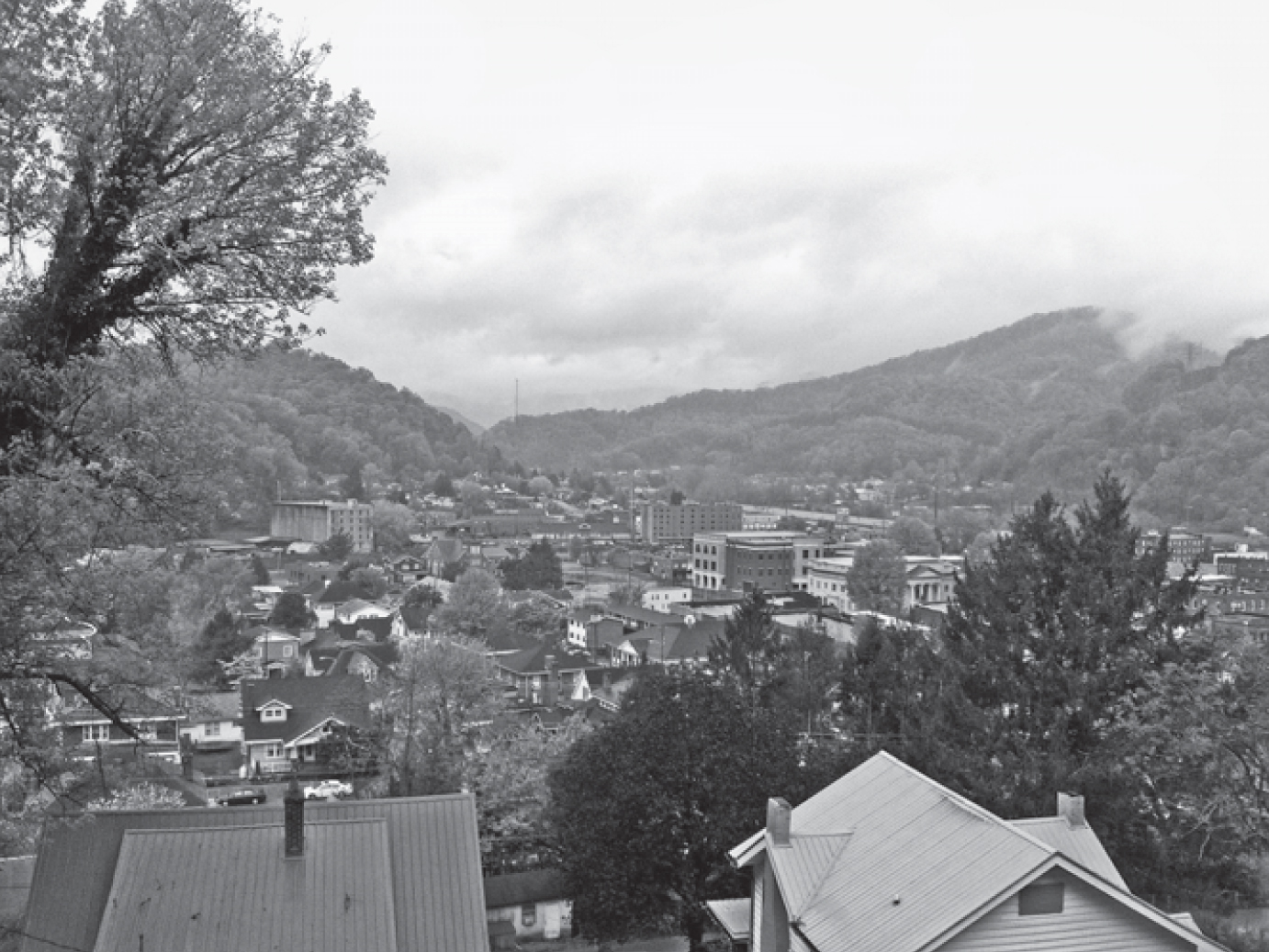
The town of Harlan, in eastern Kentucky, had been dry until a few years ago. Alcohol is now permitted in restaurants; only one has applied for the license.
My father, a Presbyterian minister, spoke of bootleggers with disdain, but he kept an intellectual distance from any personal judgment. For instance, I dont think hed have been critical of the owner of a grocery store that happened to sell beer; if theological push came to shove, I dont think hed consider bootlegging itself sinful. It was the flouting of the law, the servicing of something secret and illicit, that made bootleggers culpable. Still, the community had standards and expected their clergy to embrace prevailing ethical principles, and so I was raised to view bootleggers as ideologically corrupt as well as lawless.
Eastern Kentucky then was becoming less isolated, thanks to VCRs and cable television, but even to this day its still the type of place where youre lucky after pushing seek on the radio to catch a station. Geographically, the town of Harlan is cut off by mountains that make it a days drive to a shopping mall of any size. Each time a friend got his drivers license, a new world opened up, circumscribed by the Dairy Queen parking lot, an abandoned water plant covered with kudzu, the loading dock of an old coal tipple, and the strings of mostly empty roads in the valleys that connected them.
Only after living outside of Appalachia did I come to understand how unusual it was to grow up in a place with no liquor stores, no bars, and by extension, no restaurants. (It turns out that if people cant drink, they dont bother to go out to eat.) This may seem like a small thing, but it essentially precludes any evening activity outside the house. Nearly all of the places to eat in Harlan are fast-food chains. Going out might mean going to Pizza Hut, the only sit-down place with waiters. Maybe its not surprising that kids tended to find their way more readily into sketchy situations, such as ditching class to go drink bootlegged Zima down by the river.
Most of my friends were patrons of the Pine Mountain bootlegger, but Smitty, the guitar player in my high school band Nicotine Jimmy Dog, preferred Mags, a more mainstream option located conveniently in town. Mag Bailey sold liquor out of her house for nearly eighty years, just a few hundred feet from the elementary school. She was rumored to have escaped various prosecutions by paying federal excise tax on her sales, thus protecting herself from the most severe criminal penalties should things have gone south. It was also said that she bought off the local officials with well-placed bribes and long-term investmentsshe reportedly paid the law school expenses for some of the towns attorneys. Im not sure that all of this is true, or that it explains everything, but everybody knew Mag and what she was up to, and shed been operating with impunity for decades.
Mag lived on a street named after her. She had a paved blacktop circle behind an outbuilding next to the housea kind of drive-through windowand kept an elderly man in her employ to run the shop. Mags was open during the daylight hours, and I remember driving there as a fifteen-year-old on a bright fall afternoon with Smitty and picking up a pint of Southern Comfort before going to band practice. Mags sold moonshine, too, but when youre not old enough to drive, you sort of want to start with something manageable.
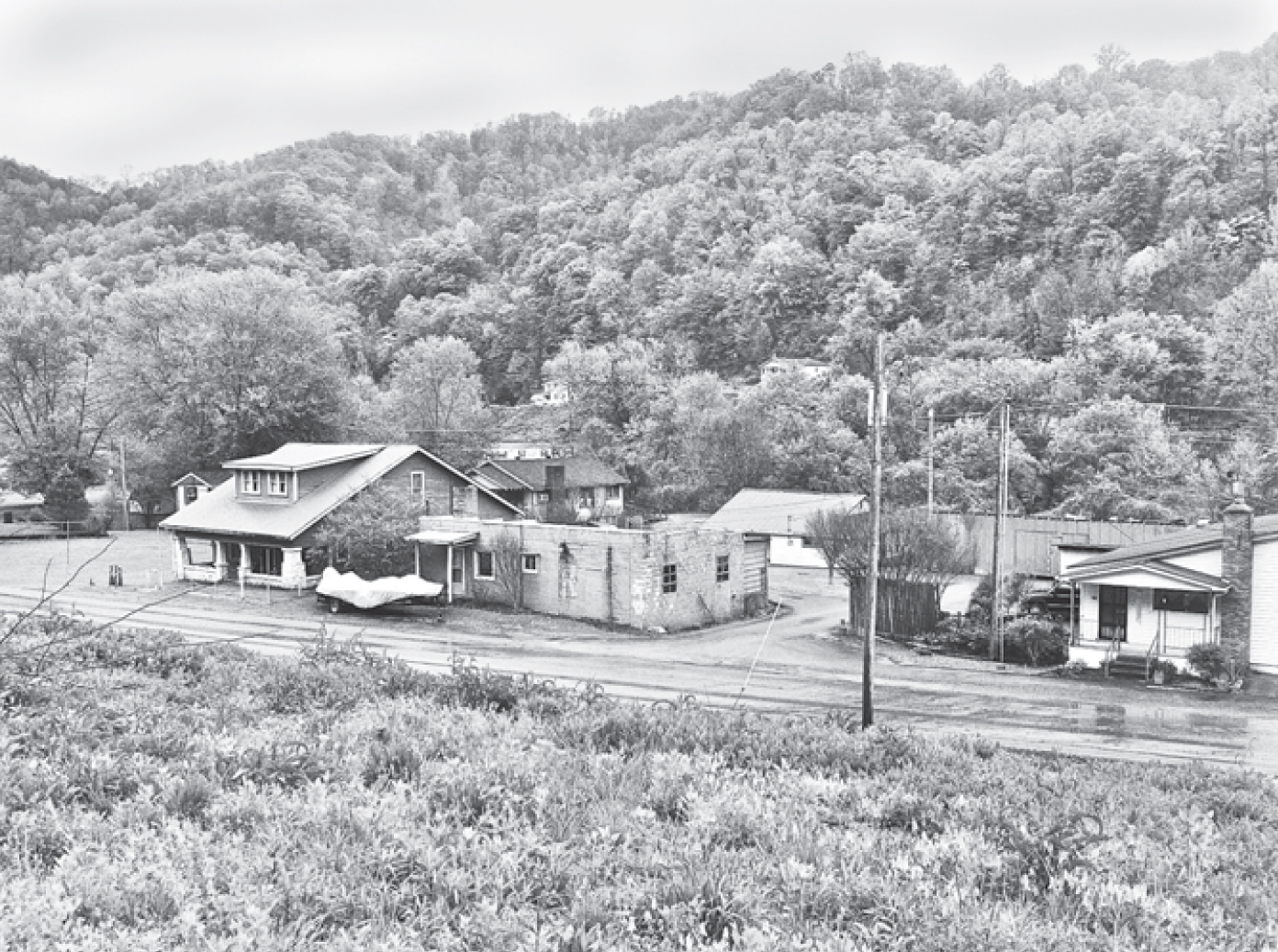
The former home of well-known bootlegger Mag Bailey in Harlan. Alcohol was resold from the garage next to the house to patrons who drove down the adjacent alley to a waiting area.
Mag Bailey died in 2005 at the age of 101. Her passing was eulogized in the Lexington Herald-Leader, on the Jimmy Buffett fan website, and on NPR. Otis Doan, perhaps one of her commissioned lawyers, gave a folksy interview and filled in some token nostalgia about Mags life and her old practices. Otiss son Sean was in my class at school and had the unusual habit of making bullying comments while he inhaled. Once I found Sean and another classmate pounding Budweisers in the bathroom at Creech Drugstore. They asked me if I wanted some and started inhaling the words beer pressure over and over again. These were the heady days of coming of age in a dry town, and to hear Otis Doan talking about Mag with such affinity prompted mixed feelings.
Next page
